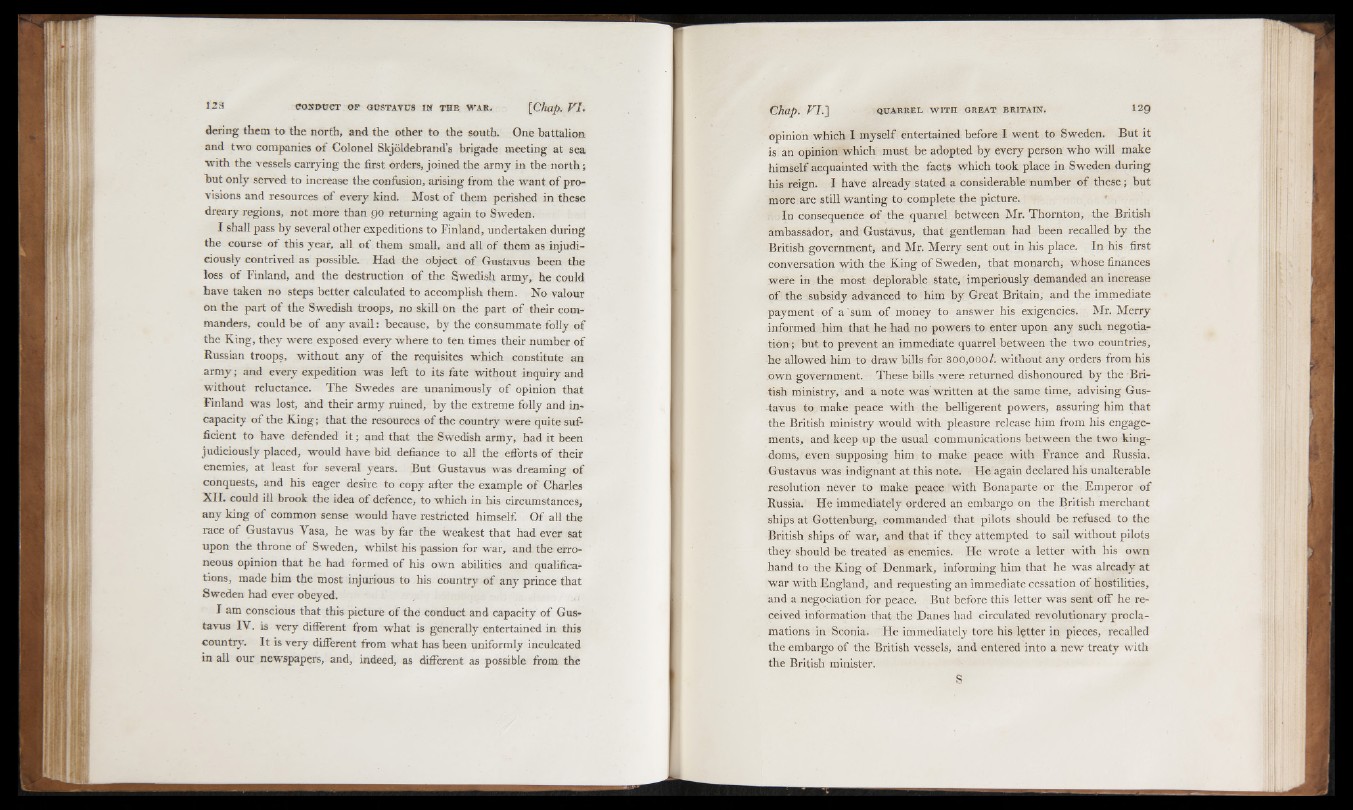
dering them to the north, and the other to the south. One battalion
and two companies o f Colonel Skjbldebrand’s brigade meeting at sea
with the vessels carrying the first orders, joined the army in the north;
but only served to increase the confusion, arising from the want of provisions
and resources o f every kind. Most of them perished in these
dreary regions, not more than 90 returning again to Sweden.
I shall pass by several other expeditions to Finland, undertaken during
the course of this year, all of them small, and all o f them as injudiciously
contrived as possible. Had the object o f Gustavus been the
loss o f Finland, and the destruction of the Swedish army, he could
have taken no steps better calculated to accomplish them. No valour
on the part of the Swedish troops, no skill on the part o f their commanders,
could be o f any avail: because, by the consummate folly of
the King, they were exposed every where to ten times their number of
Russian troops, without any of the requisites which constitute an
army; and every expedition was left to its fate without inquiry and
without reluctance. The Swedes are unanimously of opinion that
Finland was lost, and their army ruined, by the extreme folly and incapacity
o f the King; that the resources o f the country were quite sufficient
to have defended i t ; and that the Swedish army, had it been
judiciously placed, would have bid defiance to all the efforts o f their
enemies, at least for several years. But Gustavus was dreaming of
conquests, and his eager desire to copy after the example o f Charles
XII. could ill brook the idea of defence, to which in his circumstances,
any king of common sense would have restricted himself. Of all the
race of Gustavus Vasa, he was by far the weakest that had ever sat
upon the throne of Sweden, whilst his passion for war, and the erroneous
opinion that he had formed of his own abilities and qualifications,
made him the most injurious to his country of any prince that
Sweden had ever obeyed.
I am conscious that this picture of the conduct and capacity o f Gustavus
IV. is very different from what is generally entertained in this
country. It is very different from what has been uniformly inculcated
in all our newspapers, and, indeed, as different as possible from the
opinion which I myself entertained before I went to Sweden. But it
is an opinion which must be adopted by every person who will make
himself acquainted with the facts which took place in Sweden during
his reign. I have already stated a considerable number of these ; hut
more are still wanting to complete the picture.
In consequence o f the quarrel between Mr. Thornton, the British
ambassador, and Gustavus, that gentleman had been recalled by the
British government, and Mr. Merry sent out in his place. In his first
conversation with the King o f Sweden, that monarch, whose finances
were in the most deplorable state, imperiously demanded an increase
of the subsidy advanced to him by Great Britain, and the immediate
payment of a sum o f money to answer his exigencies. Mr. Merry
informed him that he had no powers to enter upon any such negotiation
; but to prevent an immediate quarrel between the two countries,
he allowed him to draw bills for 300,oool. without any orders from his
own government. These bills were returned dishonoured by the British
ministry, and a note was written at the same time, advising Gustavus
to make peace with the belligerent powers, assuring him that
the British ministry would with pleasure release him from his engagements,
and keep up the usual communications between the two kingdoms,
even supposing him to make peace with France and Russia.
Gustavus was indignant at this note. He again declared his unalterable
resolution never to make peace With Bonaparte or the Emperor of
Russia. He immediately ordered an embargo on the British merchant
ships at Gottenburg, commanded that pilots should be refused to the
British ships o f war, and that if they attempted to sail without pilots
they should be treated as enemies. He wrote a letter with his own
hand to the King of Denmark, informing him that he was already at
war with England, and requesting an immediate cessation of hostilities,
and a négociation for peace. But before this letter was sent off he received
information that the Danes had circulated revolutionary proclamations
in Sconia. He immediately tore his lçtter in pieces, recalled
the embargo of the British vessels, and entered into a new treaty with
the British minister.
S